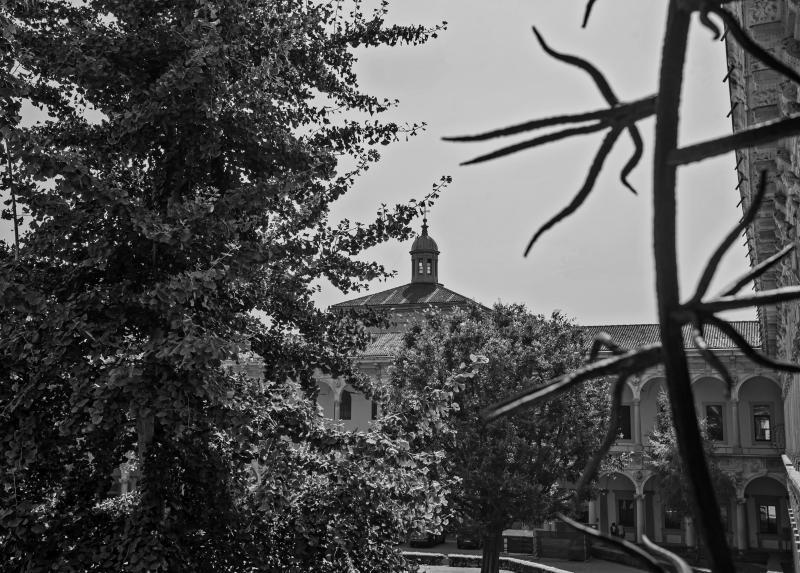
The University of Milan
On the occasion of the Holocaust Memorial Day - this year more tragic than ever due to the situation in the Middle East - the University of Milan decided to pay homage to life senator Liliana Segre.
In front of a visibly moved audience that filled every corner of the Great Hall, and in the presence of the Ministry of University and Research Anna Maria Bernini, Liliana Segre was awarded an honorary Master’s degree in Historical Sciences. These were the grounds stated on her degree parchment: “for contributing to historical research with her extraordinary testimony; for providing new generations with the tools to understand some fundamental events of our past; for her rigorous and objective account of the unspeakable; for her strenuous fight against the indifference and oblivion to the horrors of the Shoah, and ultimately for her commitment against all forms of antisemitism, racism and intolerance”.
After the opening remarks of Anna Maria Bernini and the introductory speeches given by Elio Franzini and Andrea Gamberini - Rector of the University of Milan and Head of the Department of Historical Studies respectively -, historian Marco Cuzzi delivered a laudatio entitled Quel lungo sentiero di Liliana Segre (The Long Road of Liliana Segre).
Rector Elio Franzini opened his speech with a quote from Dostoevsky’s The Brothers Karamazov, introducing the core topic of children, “whose tears can never be justified” and whose sufferings “prevent the eternal harmony”. The Rector mentioned that Liliana Segre was just a girl when the train left from track no. 21 at the Central Station, “leading her towards one of the most irredeemable atrocities that History has ever produced”. “And yet History keeps producing new atrocities, keeps massacring children, from the Gaza Strip to Sudan, from Congo to Mali and Ukraine”, Franzini continued. As the Rector recalled, Segre herself once said that she felt like a “helpless spectator” of the war, “in pain for Israel, but also for all the innocent Palestinians, trapped in the chain of violence and resentment”.
The honorary degree awarded to Liliana Segre is a direct reference to what the Rector sees as the fundamental role of universities: “to keep the memory alive - and that of the Shoah in the first place -, to cultivate this memory and pass it down to new generations - never stopping the process”.
Franzini warned the audience to “stay alert and awake” - a quote from Thomas Mann’s Doctor Faustus - to not give in “to the separateness that kills”. He then concluded: “It is in history and through history that we have to exercise our right and duty to preserve the memory”. To put a stop to oblivion, and help young people truly feel the power of memory: this is the goal of today’s ceremony for the Rector. “This is the value of memory, this is the gift that Liliana Segre has given us today”.
Professor of Contemporary History Marco Cuzzi opened his Laudatio with a brief account of the events that would lead a young Liliana Segre to become one of the few Italian survivors of the Shoah. A road paved with sufferings, which she turned into a journey of testimony and a fight against Hatred, Silence, Indifference and Oblivion. “Silence. The silence of those who didn’t know, of those who knew and didn’t say a word, of those who looked the other way, of those who didn’t believe it”. Liliana Segre broke this silence. “Since 1990, she has paved the way forward, using her voice and her memory to escape that feeling of ‘drowning’ described by Primo Levi”. Indifference has been “the most powerful ally of the extermination, without which there would have been no extermination at all”. The “fourth horsemen” that Liliana Segre is afraid to cross path with is Oblivion. “Silent and ineluctable, covered in a thick fog: Oblivion. Forgetting everything”. But Marco Cuzzi reassured senator Segre, calling upon historical research to help preserve the memory: “Historians, and young historians in particular, will be able to free the testimony both from the chains of a merely rhetorical crystallisation, as well as from oblivion”.
The topic of history was also addressed by Prof. Andrea Gamberini, Head of the Department that proposed awarding the degree to senator Segre. “In today’s age - when history as a subject seems to be undergoing a crisis, to be perceived by many as something distant and dusty, or even, to use the words of historian Giorgio Chittolini, “a remote country”, something appreciated only for its exotic otherness -, senator Segre strongly voiced the fundamental value of history, and keeps reminding us of the importance of historical memory for our present times”.
Honorary graduates are usually asked to give a lectio magistralis, but for the occasion, this ceremonial moment took the form of a dialogue between Liliana Segre and journalist Enrico Mentana on the topics of testimony and memory.
At the end of the dialogue, the Rector, accompanied by student Elia Montani and research fellow Nannerel Fiano, officially bestowed the honorary Master’s degree in Historical Sciences on Liliana Segre.
To wrap up the ceremony, Milan’s Prefect Claudio Sgaraglia awarded posthumous Medals of Honour to 19 soldiers and civilians who were deported to Nazi prison camps and subjected to forced labour to support the war economy.
Orchestra UNIMI — Holocaust Memorial Day
At 8.30 pm, the Orchestra of the University of Milan will perform a concert for the Holocaust Memorial Day. The venue is once again the Great Hall of the main campus (Via Festa del Perdono 7). For the occasion, the Orchestra will be accompanied by the Noûs Quartet: Ekaterina Valiulina (violin), Alberto Franchin (violin), Sara Dambruoso (viola) and Riccardo Baldizzi (cello). They will play the String Quartet no. 8 in C minor op. 110 by Dmitri Shostakovich and the String Quartet no. 14 in D minor D. 810 by Franz Schubert (also known as Death and the Maiden). Access is free, but online registration is required.
Potrebbero interessarti anche
